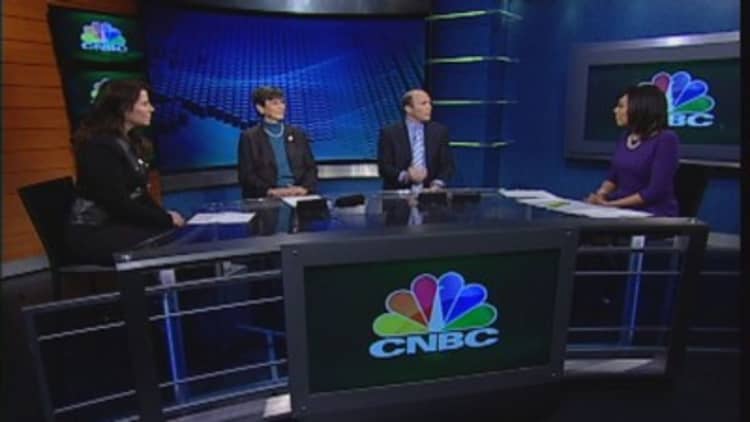
Your career is taking off. You just tied the knot—or plan to soon. And you're responsible enough now to appreciate the importance of putting part of your income aside for the future. Congratulations, you're 30.
The trick now is to avoid those all-too-common money missteps that could derail your long-term savings plan. That includes buying more house than you can afford, being overly conservative with your portfolio and, ironically, funneling too much too soon to your 401(k) plan.
"One area where young people make mistakes is they get excited about their 401(k) and they want to max it out," said Richard Salmen, a certified financial planner with GTRUST Financial Partners, noting the maximum tax-deferred contribution for 2014 is $17,500. "Then their car breaks down or their refrigerator breaks and they stop contributing altogether. I'm a much bigger proponent of starting out incrementally."
Indeed, when it comes to building a cushy nest egg, slow and steady wins the race.
Salmen said 30-somethings with an employer-sponsored 401(k) would be better served by contributing at least enough to get the employer match, which is on average 50 percent of up to 6 percent of their salary.
(Read more: Ramen noodles and retirement: How to save in your 20s)
Then, each time you get a raise, funnel half of that newfound money into your 401(k) through direct deposit—so you're not tempted to spend it.
"The other half goes to your family budget, and in five or six years you'll be able to max out your 401(k) without feeling any pain," Salmen said.
Prepare for rain
Investors in their 30s should also save outside their 401(k) for future big-ticket expenditures, including a down payment on a house, so they're not tempted to tap their retirement savings for short-term needs, Salmen explained.
Don't forget, distributions from your 401(k) before age 59½ will generally incur an early withdrawal penalty of 10 percent, although exceptions do exist in the case of financial hardship. You can borrow from your plan without incurring a penalty and pay yourself back with interest, but that also denies those dollars the chance to deliver compounded returns. (Plus, you'll owe the borrowed amount back in full if you quit your job or get fired.)
A rainy day fund provides further insulation, helping investors keep their hands out of the cookie jar when emergencies crop up—and crop up they will, Salmen said.
The fund should consist of at least six months' worth of living expenses held in a liquid interest-bearing account, although you may need a year's worth of expenses saved or more if your income is less stable.
(Read more: Are you sick over health-care costs?)
Be wary, too, of buying more home than you can afford. Lenders are far more conservative in the wake of the housing crisis, but they still qualify borrowers with good credit ratings for more house than they should buy.
Generally speaking, mortgage payments should not exceed 28 percent of your monthly take-home pay, said Phil Cook, a certified financial planner with Cook and Associates.
Borrowers can spend slightly more in the current market to capitalize on low-interest rates and favorable housing prices if necessary, but stretch too far and you'll lack the disposable income necessary to adequately feather your nest egg.
Societal pressure to keep up with the Joneses and the desire for instant gratification will have more of a negative impact on this generation.Phil Cookcertified financial planner, Cook and Associates
"Societal pressure to keep up with the Joneses and the desire for instant gratification will have more of a negative impact on this generation, because they are faced with an economy that probably won't offer the same opportunities that previous generations had," said Cook, noting job opportunities remain tight and earnings potential is increasingly limited. "It will be very hard to 'grow' out of your extravagances and luxuries."
Couples who are purchasing their first home, with the intent of leveling up to a larger pad when their income allows—and their kids outnumber the bedrooms—might also consider an adjustable-rate mortgage (ARM) to minimize their payments, said Elliot Herman, a certified financial planner and certified public accountant with PRW Wealth Management.
The monthly payment for a $200,000 mortgage at a 30-year fixed rate of 4.5 percent, for example, is $1,013, compared with $898 for an ARM at 3.5 percent.
"Take those dollars you save and put them into your retirement savings," Herman said.
(Read more: Roth IRA, state taxes don't mix)
He added, too, that some of his younger clients who are gun-shy from the Great Recession are eager to pay off their mortgages, funneling extra payments toward their loans to pay them off faster. That's a worthy goal, but from a financial planning perspective, he said, not necessarily prudent.
If history is any guide, he said, you're far better off investing those dollars in the market.
Stocks a sure thing
Indeed, according to the Stock Trader's Almanac, the benchmark S&P 500 Index has returned an average of 7.4 percent per year since 1930. (It returned an eye-popping 29.6 percent last year alone.)
Just be sure you invest for growth with an age-appropriate portfolio that consists mainly of stocks, Salmen explained.
For those in their 30s, he added, an asset allocation that is overweight on bonds and other fixed-income securities will not outpace inflation or provide the earnings potential necessary to meet long-term savings goals.
(Read more: When was the last time you checked your 401(k)?)
Many financial planners recommend 30-somethings keep up to 100 percent of their portfolio in stocks, since they still have decades to ride out volatility. But Salmen said it's important to know thyself. "Even those in their 20s or 30s don't have to go all equities. Statistically, that would probably make you more money, but from a behavioral standpoint, you might not be able to sleep," he said, adding, "A little bond exposure provides stability so you won't get whacked so hard during a downturn and you're less likely to abandon your strategy during a downturn. That's what kills you: selling at the bottom and waiting to get back in at the top."
A little bond exposure provides stability so you won't get whacked so hard during a downturn.Richard Salmencertified financial planner, Gtrust Financial Partners
For risk-averse investors, who are likely to bail when the market takes a dip, an allocation of 80 percent equities and 20 percent fixed income is not out of line.
Herman at PRW Wealth Management agreed, noting young investors should stay the course above all else.
(Read more: How to get out of an annuity)
"Time is on your side, so try to tune out the short-term noise, like people telling you where to invest, that the market is going to crash or that political events will hurt their portfolios," Herman said. "It won't have an effect on your long-term savings plan."
Get insurance, get talking
Other tips to keep your savings strategy on track is to ensure you have adequate health- and life-insurance coverage to protect your family in the event of a death or disability.
"We all like to think we are invincible in our 30s, but that's not always the case," Herman said.
Likewise, he said, make sure you discuss financial priorities with your spouse.
If your interests are aligned when it comes to investment strategy, debt management and college savings for your kids, you're more likely to reach those goals together.
Added bonus: It might even save your marriage, since money is often cited as the leading cause of divorce.
(Read more: Where did your money go?)
The financial decisions you make in your 30s will largely determine whether or not you retire on time—or at all, financial experts agree.
By keeping your fixed expenses under control, creating a financial safety net and investing for growth, you can avoid most of the financial minefields that threaten your savings.
"In order to reach your financial goals, you need to know that every dollar is being put to its best use," Cook said. "Most people don't or won't budget. This is why most people work their entire lives only to arrive at retirement without enough saved to know with great comfort that they will not outlive their savings."
—By Shelly K. Schwartz, Special to CNBC.com




